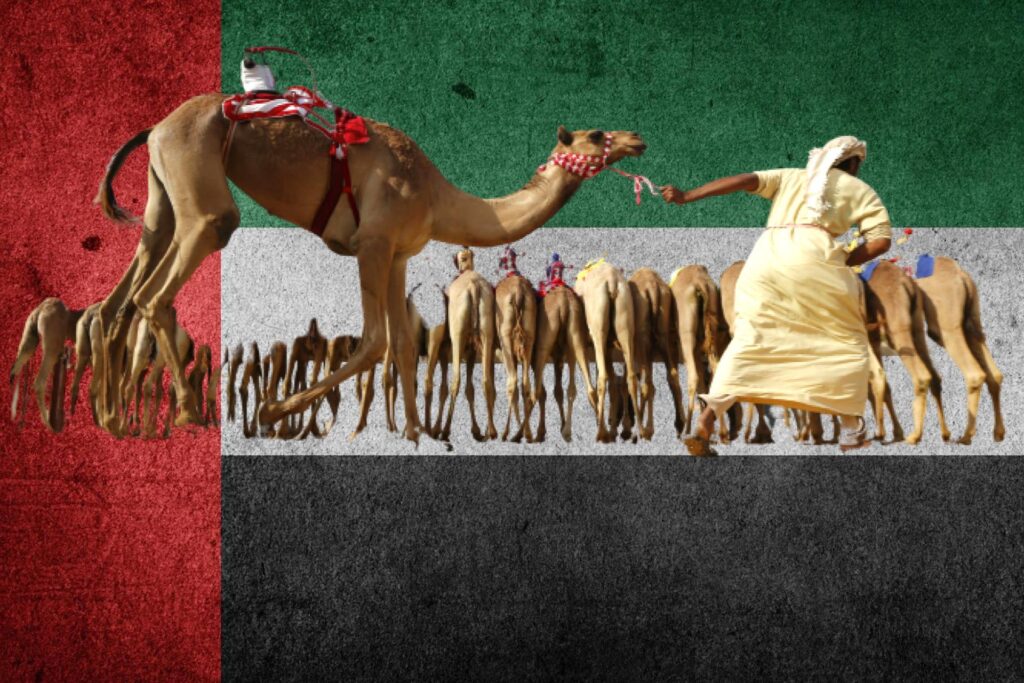UAE achieves record-breaking financial crime confiscations in 2023, nearing exit from FATF grey list. The UAE has made great strides in its fight against money laundering and terrorism financing in recent years, but 2023 is shaping up to be a particularly transformational year, with some truly remarkable achievements, experts told Arabian Business.
With massive investments in training, technology and workshops to ensure coordination on the federal level, the Executive Office of Anti-Money Laundering and Counter Terrorism Financing (AML/CFT)’s efforts are finally beginning to bear fruit.
In an exclusive interview with Arabian Business, the Director-General of the Executive Office, Hamid Al Zaabi, revealed all the progress the country has made thus far to exit the Financial Action Task Force’s (FATF) grey list.
The FATF, an intergovernmental body, establishes global standards to combat money laundering and terrorist financing. It convenes its key decision-making body, the plenary, twice a year to address evolving issues in these areas and make strategic decisions. The plenary assesses the progress of countries on the FATF’s grey list, which denotes nations with significant AML/CFT shortcomings.
The UAE was placed on the FATF’s grey list in June 2022. The FATF said that the UAE had made “significant progress” in implementing its action plan, but that it needed to do more to address its AML/CFT deficiencies. The UAE has been working closely with the FATF to address its remaining deficiencies.
“The UAE has built an effective system that is predicated on a risk-based approach; a detailed understanding of the risks and vulnerabilities to then develop steps to mitigate risks accordingly. This is done through a National Risk Assessment, and we are now at an advanced stage of our second NRA using World Bank Group Methodology,” Al Zaabi told Arabian Business.
“At the last FATF plenary, the UAE was given positive feedback on the ‘significant progress’ made in relation to FATF Recommendations, which are the technical and legal building blocks for an effective framework to combat money laundering, terrorist financing, and counter-proliferation financing,” he revealed.
Director-General of the UAE’s Executive Office of Anti-Money Laundering and Counter Terrorism Financing, Hamid Al Zaabi, says the UAE has made significant progress in its fight against money laundering and terrorism financing.
There are currently 26 countries on the FATF grey list, as of June 2023.
Black list countries include the Democratic People’s Republic of Korea, Iran and Myanmar.
Nations aspire to secure a position on the FATF’s white list as it signifies the presence of robust controls against AML/CFT. Inclusion on this list can enhance a country’s appeal to foreign investors and boost its international standing.
AML/CFT confiscations, inspections to hit new record in 2023
With numerous efforts underway, from international to public-private cooperation, the country is making remarkable headway.
The number of Suspicious Transaction Reports (STRs) identified in the second quarter of this year rose 17 percent since Q1, and during the same period, Designated Non-Financial Businesses and professions (DNFBPs) and Dealers in Precious Metals and Stones (DPMS) submissions surged 14 percent and 23 percent respectively.
“The Financial Intelligence Unit (FIU) deserves credit, and its standing in the global community was recognised when it hosted in Abu Dhabi the 2023 annual Plenary for the Egmont Group, a global organisation that facilitates the exchange of information, knowledge, and cooperation amongst 170 FIU members,” Al Zaabi explained.
Between March and mid-July this year, the UAE achieved the world’s highest financial crime confiscations, registering a 108 percent increase from Q1 to Q2 alone.
“The effectiveness of our system can be seen in the figures for confiscations, which are among the highest in the world,” he added.
“The relevant bodies in the UAE are ensuring that criminal funds are confiscated and prevented from entering the financial system again – to undermine further criminal activity – and they have successfully confiscated more than AED1.3 billion (approx. $356 million).”
Enforcement actions have also risen substantially. During the first half of the year, supervisors of financial institutions and DNFBPs issued collective fines totalling more than AED199 million ($54.2 million).
The UAE’s efforts to combat money laundering have been praised by the FATF, and the country continues to work very closely with the taskforce on its action plan. So far, their cooperation has been positive, said Al Zaabi.
“FATF assessment is ongoing. At the past three plenaries in Paris, FATF said: ‘the UAE [has] demonstrated significant progress’,” the Director-General added.
“We continue to work to implement our FATF action plan and are working closely with the ICRG [International Country Risk Guide] and will be meeting in September this year for the next review, ahead of the October FATF plenary.”
New entities launched to combat UAE financial crime
In late July, the UAE launched new federal prosecution entities for economic crimes and money laundering in an effort to develop the country’s judicial system to align with global economic shifts and introduce more specialised judicial entities.
The entities plan to clamp down on illicit financial activity including corporate crimes, bankruptcy, regulation of competition, and financial markets, as well as intellectual property, trademarks and financial rights violations.
“This initiative should improve judicial outcomes, and it illustrates that the UAE is investing considerably in the investigation, prosecution and sentencing of financial crimes, as part of its strategy to enhance its national framework,” Al Zaabi said.
Among many other cases, in May this year, an Abu Dhabi Criminal Court sentenced 13 individuals and seven companies for laundering AED510 million ($139 million) in point-of-sale crimes committed in the UAE. The prosecuted individuals were handed jail sentences and the companies involved were fined AED10 million each.
“These courts are also representative of a wider trend, which is the growing number of professionals in the Emirates with specialised training, skill sets and expertise in anti-financial crime. The addition of these professionals underlines our seriousness about building a long-term and sustainable system.”
The UAE seems to have seriously intensified its crackdown over the past two years. Last month, the Ministry of Interior announced that it effectively addressed 521 cases of money laundering during the two-year period and collaborated with international law enforcement agencies to apprehend 387 suspects who were wanted globally. These combined efforts led to confiscations worth more than $1 billion.
UAE eyes full FATF membership
According to Al Zaabi, International cooperation will remain an important feature of the Executive Office’s strategy.
“The UAE’s vision is to be a world leader in the field of fighting financial crime, and to continually strengthen our national system so that criminals are denied any opportunity in the Emirates. We have an ambitious program for the years ahead,” he said.
“We will build on our participation in FATF-style Regional Bodies such as MENAFATF [Middle East and North Africa Financial Action Task Force].”
Since the UAE was granted official observer status this year by the Asia-Pacific Group, the “logical next step might involve preparing to apply for full FATF membership.”
Another integral part of the strategy is to accelerate tech adoption, Al Zaabi said, emphasising the Executive Office’s intention to amp up its use of cloud computing, AI, Machine Learning and Big Data.
“We are currently implementing a digital transformation program to become an intelligent technology-based organisation. Our data intelligence project will automate data management protocols and procedures, and is being carried out with a consortium of leading UAE-based companies including G42 Cloud and SAPient Technologies,” he said.
“While we expect technology to play an increasingly powerful role, it will never replace human talent and a dedicated workforce. We have been nurturing Emirati talent to enter the agencies at the front line of the UAE’s response to financial crime, in addition to young professionals in the private sector.
“This starts with our financial crime awareness initiatives, and continues with university scholarships and the development of specialist ML/TF [Money Laundering and Terrorism Financing] courses at a Masters level. Once in the workforce, young Emiratis have the opportunity to take part in international exchanges, study for executive courses, and take on leadership roles.”
UAE makes progress but major global challenges ahead
In a recent August 2023 FATF assessment, the UAE ranked “compliant” with 15 of the fourty recommendations and largely compliant with 24, recording no “non-compliant” ratings.
Although global money laundering activity in 2022 was at about the same level as 2021, the risk level declined slightly. This may initially seem positive, but it actually highlights a lack of progress worldwide, pointing to gaps in protection, vulnerabilities in processes, and a failure to mitigate risk.
“In the world of the money launderers, this just means they still have opportunities and room to manoeuvre,” Hazim Mulhim, CEO and Founder of Eastnets, a Dubai-based security firm specialising in financial crime, told Arabian Business.
Crypto has been a key driver for money laundering. This has been recognised by many regulators across the world, all of which are beginning to take steps towards setting up a taskforce to focus on crypto regulations. However, the UAE is considered to be ahead of the curve, as it set up a designated Virtual Assets Regulatory Authority (VARA) in 2022.
“Without regulations and enforcement of the regulations, crypto would provide a ‘Wild West’ for money laundering,” he said.
“The UAE has taken significant steps to tackle money laundering and financial crimes and these efforts are yielding fruitful results. Money launderers look for chinks in the armour of banks and if protective measures and sanctions are not applied, there is a high risk of exploitation,” Mulhim added.
Though the UAE has clamped down massively on financial crime, placing great importance on leveraging modern technology to facilitate the reporting of suspicious transactions, expedite procedures and make informed decisions about the issuance of fines, trade-based money laundering (TBML) still represents a significant challenge; not just for the UAE, but the wider GCC as well.
“Tactics of the financial criminal morph to exploit complex trade transactions to hide illegal money transfers,” Mulhim explained.
TBML is becoming more complex and sophisticated, and as the chains of money laundering are typically intertwined with multiple methods of obfuscation and fraud, it can be difficult for financial institutions to “disentangle these chains,” he added.
Mulhim believes the new specialised entities set up to focus on the specifics of financial crime is “good news for the UAE.”
“UAE has a large expat population and cross-border facilitation of financial crime and money laundering is a specific opportunity. The body will align with ‘We the UAE 2031‘ and will hopefully collaborate and coordinate with other jurisdictions. This level of focus and collaboration will be instrumental in tackling money laundering and specifically TBML.”
“The Gulf countries are working hard on the challenges of money laundering and various regulators act across the region to enforce regulations and laws that moderate money laundering, including TBML. The recent announcement from the UAE to establish federal prosecution to further combat financial crimes is good news and show the country’s efforts to achieve financial stability and economic progress.”
The country seems to have taken on a more collaborative approach, working on integrated solutions and bringing together working groups comprising regulators, banks and other financial institutions, vendors, government policy makers and solution providers like Eastnets itself.
“The agenda the UAE government is working on is to put Dubai on the white list and make it compliant with the national standards of money laundering,” he said.
“The UAE has already adopted huge steps in combating AML and other financial crimes, and achieved tangible progress in this regard, which has been regarded by several relevant international bodies, namely the FATF and MENAFATF. The regulator is also developing new systems and standards, such as supervisory and regulatory technology, fortifying operations and bolstering the resilience of the financial system.”
September 8, 2023 Published by The Arabian Business News.







